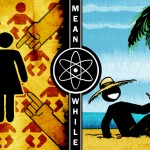Each week in “Under the Sun,” Jonathan Sircy examines the history of a cultural practice that’s generating buzz at CaPC.
If you saw that jailed Arizona minister Michael Salman hired John Whitehead to be his attorney and thought, “Yeah. That seems about right” then this column will be old hat.
If, on the other hand, you’ve never heard of Whitehead and the Rutherford Institute he founded, prepare to be sucked into the vortex of the Christian legal movement.
You don’t have to look very far for stories about American Christians who feel that their religious rights are being taken away by an increasingly secular state. When you’re finished scanning through the seemingly endless stories of shutdown Bible studies, neutered public prayers, and stripped Ten Commandments displays, you’ll find all the necessary ingredients for a Christian litigant stew. Somebody has to stir that pot. That “somebody” is frequently John Whitehead.
Whitehead unofficially started the Christian legal movement 30 years ago by creating The Rutherford Institute, a Charlottesville, Virginia-based “civil liberties organization that,” in its website’s words, “provides free legal services to people whose constitutional and human rights have been threatened or violated.” Named after the 17th Century theologian Samuel Rutherford, a public opponent of the Divine Right of Kings, the institute has made its name defending Christians like Salman, though the group does not defend Christians exclusively and its “About Us” statement mentions no religious affiliation or special interest. As for its legal expertise, the institute lists “issues” ranging from the bread-and-butter civil liberties topics of “free speech” and “religious freedom” to the more idiosyncratic dilemmas of “right to life” and “search and seizure.”
Within the last five years, Whitehead has done work for everyone from two Maryland high-school students expelled under a no-tolerance policy to the infamous Texas Westboro Baptist Church who stages protests during military funerals. Whitehead has been at this for a long time, having written a book in 1977 called The Separation Illusion which attempts to debunk misconceptions about the First Amendment. Whitehead gained wider national notoriety when he represented Paula Jones in her sexual harassment suit against Bill Clinton. His most recent cases have involved the right to privacy (Whitehead labeled the Bush administration “the worst free speech regime since, well . . . ever.”)
Something of an iconoclast, John Whitehead boasts the middle name “Wayne” and has divulged in several interviews that he never attends church though he still considers himself a “strong Christian.” Colleague Josh Wheeler says that Whitehead’s modus operandi is less about diagnosing whether an issue is the domain of the “left” or “right” and more about seeking out the disenfranchised: “If you want a more accurate predictor of the side Rutherford [Institute] will take in any cause, ignore politics and find the underdog. It’s a pretty safe bet that’s whose side Rutherford will take.”
The Rutherford Institute, according to a 2007 article, boasts a yearly budget of nearly $2 million and a roster of 250 attorneys. But Rutherford isn’t the only game in town.
The Alliance Defense Fund, for instance, has a yearly budget of $30 million. Its founders include such Christian right notables as Bill Bright (Campus Crusade for Christ), Larry Burkett (Crown Ministries), and James Dobson (Focus on the Family). The American Center for Law and Justice, founded by Pat Robertson, has made headlines recently through its Tweet for Youcef campaign, an effort designed to free imprisoned Iranian minister Youcef Nadarkhani. The Thomas More Law Center got its start with the help of Domino’s Pizza founder Tom Monaghan. It has been heavily involved in the Catholic Church’s protest against Obamacare. All three were started in the 1990s.
So back to the Salman case. As CaPC’s Brad Williams pointed out last week, Salman’s legal position is tenuous at best. What exactly will John Whitehead say in his defense?
In a recent interview, Whitehead explained why he thought Salman’s case was important: “The danger of this case is the government is trying to establish what is and isn’t a church. When it does that they are overstepping the boundary. This violates the very foundation of that Amendment and the Establishment Clause.”
But he’s most revelatory when he discusses how Christians should relate to civil government, offering a raison d’etre for the entire Christian legal movement:
I don’t think God intended on us [sic] to obey unlawful ordinances. If so, He must be pleased with Hitler huh? Look at Jesus, Paul and Peter in the bible. All were persecuted for disobeying the law. Jesus was crucified, Paul was jailed, beaten and beheaded, Peter was crucified upside down. If Christians were to obey every law of the land then persecution would not exist as Christians would be in lockstep with the government. Christians need to be in lockstep with Christ not the government. If Christians united behind my client, he wouldn’t be in prison right now. But they are twisting a scripture in support of the government. Christians in this day are quiet, and backing down behind the government order.
The theology behind Whitehead’s statement is fodder for a Citizenship Confusion or Sacred Space column, but I’ll close with a few comments on Whitehead’s rhetoric.
First, it’s important that he appeals to examples from the early church rather than American history. Whitehead doesn’t try to make his point by appealing to the faith of the nation’s founding fathers. He establishes it by showing that legal conflict with the civil government was a defining feature of the church’s establishment.
Second, Whitehead offers a political pluralism amped up on steroids. If Christians are serious about toleration, he argues, then they should be willing to defend their own place at the table through legal, non-violent methods.
The real question is whether Whitehead represents a port in—or, conversely, the eye of—America’s current political storm. He bemoans the passivity of American Christians, but groups like The Rutherford Institute, the Alliance Defense Fund, and the rest testify to a growing community of Christian legal activists. It remains unclear whether Whitehead is a religious advocate working outside the country’s increasingly partisan squabbles or just another contrarian whose message skews to the extreme right.












